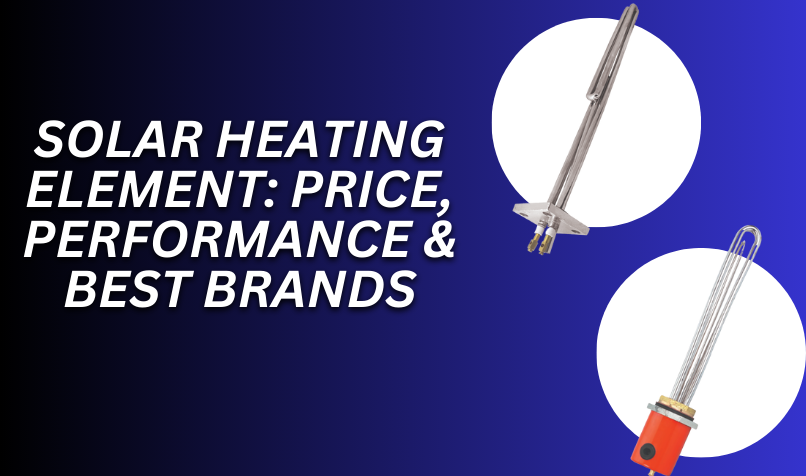
With the rising adoption of solar energy in India, solar heating element is playing a critical role in improving system efficiency for both residential and industrial applications. Whether you're installing a new solar water heater or upgrading your existing setup, choosing the right heating element can significantly impact performance, cost, and durability.
In this comprehensive guide, we’ll explore the price range, performance factors, and top brands for solar heating elements in India.
What is a Solar Heating Element?
A solar heating element is an electrical component designed to convert solar energy into heat. It is used in systems such as:
These elements are engineered to withstand high temperatures and harsh outdoor conditions while ensuring efficient heat transfer. Depending on your application, they can come in various designs, including immersion-type, screw plug, or flanged heating rods.
Price of Solar Heating Elements in India
The solar heater element price in India varies based on several specifications:
Average Price Range by Wattage
|
Wattage |
Price Range (INR) |
|
1000W – 2000W |
₹500 – ₹1,000 |
|
2000W – 3000W |
₹1,000 – ₹1,800 |
|
3000W – 5000W |
₹1,800 – ₹3,000 |
Custom-built models, bulk orders, and brand reputation may influence the final cost.
Key Factors That Affect Performance
When choosing a solar immersion heater or heating element for your solar tank, consider the following:
1. Material Quality
Durability and heat efficiency depend largely on the material. For instance, Incoloy and Stainless Steel 316 resist corrosion and perform well in hard water conditions.
2. Thermal Efficiency
A good element should convert electrical energy into heat quickly and with minimal energy loss. Look for fast heat-up times and low standby loss.
3. Compatibility
Check compatibility with your solar heating coil system in terms of voltage, mounting type, and tank size.
4. Safety Features
Top brands include features like thermal cutoffs, thermostats, and overheat protection, which are essential for system longevity and user safety.
Applications of Solar Heating Elements
Solar heating rods and coils are used across a range of applications, including:
Their eco-friendliness, energy savings, and low operational costs make them a sustainable alternative to gas or electric heating.
Best Solar Water Heater Element Brands in India
Choosing a trusted brand ensures better build quality, reliable support, and compliance with safety standards.
1. Powerpack Electricals
One of the most trusted solar heating element manufacturers in India, Powerpack Electricals is known for:
Powerpack elements are widely used by solar installers and thermal system integrators.
2. Elmec Heaters
A reputed name offering reliable solar heating rods with standard safety features and long service life.
3. Tempsens
An industrial-grade manufacturer known for precision-engineered heating elements, especially suitable for high-temperature and large-volume solar heating systems.
4. Rama Corporation
A global supplier offering advanced solar-compatible heating components used in hybrid systems and commercial boilers.
Comparison Table: Top Brands
|
Brand |
Wattage Range |
Material Options |
Key Features |
Typical Use |
|
Powerpack Electricals |
1000W–5000W |
Incoloy, SS304/316 |
High efficiency, custom builds |
Domestic, industrial |
|
Elmec Heaters |
500W–3000W |
SS304, Incoloy |
Durable, compact design |
Water tanks, geysers |
|
Tempsens |
1000W–6000W |
SS, Copper |
Precision, industrial-grade |
Large-scale thermal systems |
|
Rama Corporation |
Up to 7000W |
SS, Incoloy |
Hybrid-compatible, export grade |
Commercial solar systems |
Before You Buy: Checklist
Conclusion
Investing in a high-performance solar water geyser heating element ensures long-term savings and eco-efficiency. With brands like Powerpack Electricals, you can expect durable materials, competitive pricing, and custom solutions tailored to Indian conditions.
Whether you're buying a solar heating element for a water tank, upgrading your hybrid system, or exploring solar solutions for industrial use, understanding specifications and comparing brands will help you make a smart investment.
FAQs About Solar Heating Elements
Q: What is the typical life span of a solar heating element?
Most high-quality elements last between 3 to 5 years, depending on water quality and usage.
Q: Can I use a regular heating element in a solar water heater?
It’s not advisable. Solar-compatible elements are built for better efficiency and durability under fluctuating solar conditions.
Q: What’s the difference between a solar heating rod and a coil?
A heating rod is typically immersion-type, while a heating coil may be used in indirect heating systems. Both serve the same purpose but are chosen based on design compatibility.
Q: Is Powerpack Electricals certified or approved?
Powerpack Electricals provides heating elements that comply with industry norms. You should confirm certifications like BIS or ISO during purchase.
Q: How much electricity does a 2000W solar heating element consume?
It consumes 2 units per hour when powered electrically. However, with solar thermal systems, the actual grid usage may be significantly reduced.